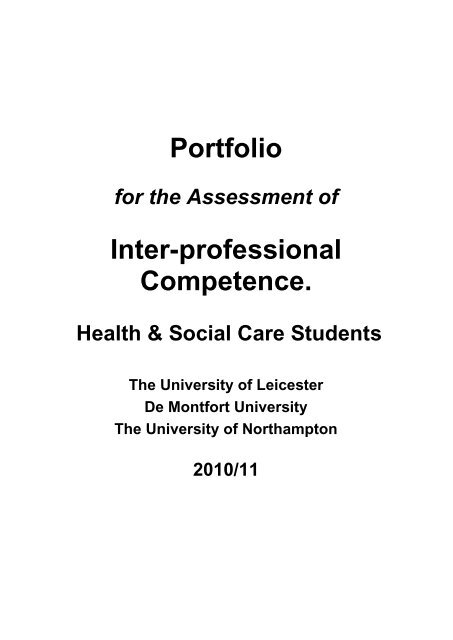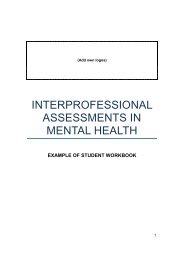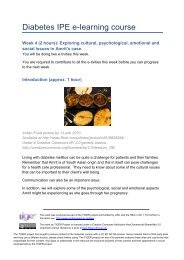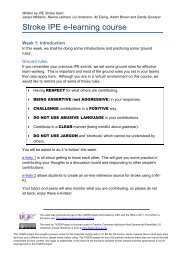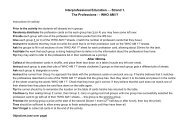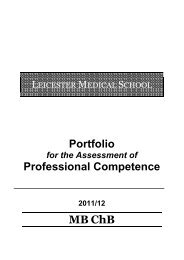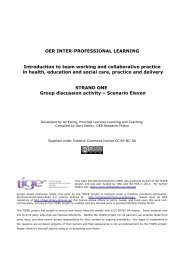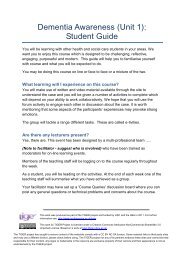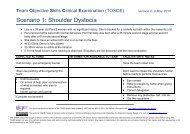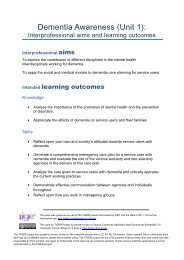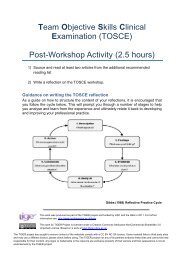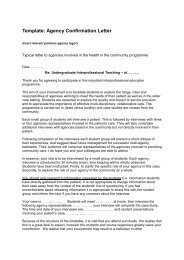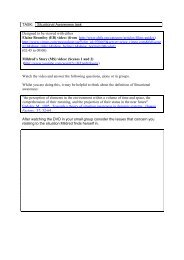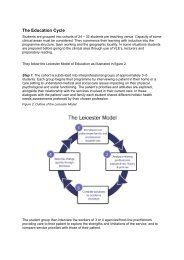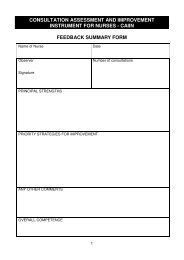Example Portfolio for students at Leicester-Northants-Demontfort Unis.
Example Portfolio for students at Leicester-Northants-Demontfort Unis.
Example Portfolio for students at Leicester-Northants-Demontfort Unis.
Create successful ePaper yourself
Turn your PDF publications into a flip-book with our unique Google optimized e-Paper software.
<strong>Portfolio</strong><br />
<strong>for</strong> the Assessment of<br />
Inter-professional<br />
Competence.<br />
Health & Social Care Students<br />
The University of <strong>Leicester</strong><br />
De Mont<strong>for</strong>t University<br />
The University of Northampton<br />
2010/11
Personal Details<br />
Student’s Name/ ID Number:<br />
___________________________________<br />
Age <strong>at</strong> entry into pre-registr<strong>at</strong>ion training:<br />
________________________<br />
Gender: MALE FEMALE<br />
PLEASE TICK <br />
Professional group:<br />
___________________________________<br />
Entry intake d<strong>at</strong>e:<br />
___________________________________<br />
Mentor/Personal Tutor Name: ___________________________________<br />
If this m<strong>at</strong>erial is found please return to:<br />
2
Contents<br />
Personal details 2<br />
Page<br />
Glossary of Terms 4<br />
Purpose of this portfolio 5<br />
Introduction 6<br />
SECTION ONE –<br />
SECTION TWO<br />
SECTION THREE<br />
SECTION FOUR<br />
SECTION FIVE<br />
<strong>Portfolio</strong> Guidance 7<br />
Strand Learning Outcomes 15<br />
Reflective Record of Strand Learning 19<br />
Strand One 20<br />
Strand Two 22<br />
Strand Three 24<br />
Evidence 26<br />
Final Reflections and Mark 29<br />
Appendix 32<br />
Alignment to each professional curriculum 33<br />
Marking Criteria 38<br />
SECTION SIX<br />
Sign<strong>at</strong>ures Record of Attendance 42<br />
3
Glossary of Terms<br />
HEI’s<br />
Higher Educ<strong>at</strong>ion Institutions<br />
IP<br />
Interprofessional<br />
IPE<br />
Interprofessional Educ<strong>at</strong>ion<br />
IPL<br />
Interprofessional Learning<br />
IPW<br />
Interprofessional working<br />
CAIPE<br />
UK Centre <strong>for</strong> the Advancement of<br />
Interprofessional Educ<strong>at</strong>ion<br />
4
Purpose of this <strong>Portfolio</strong><br />
Wh<strong>at</strong> is this portfolio <strong>for</strong>?<br />
This is your personal record of all your interprofessional learning throughout your<br />
training, some of which will be organised sessions and some will take place<br />
opportunistically while in practice. Interprofessional educ<strong>at</strong>ion has been clearly<br />
defined in the introduction of this portfolio. On completion of your pre-registr<strong>at</strong>ion<br />
programme this portfolio can be transferred into your professional development<br />
portfolio where you can continue to record all on-going learning on team working and<br />
collabor<strong>at</strong>ive practice to support your registr<strong>at</strong>ion.<br />
You must keep this document safe and take it to all interprofessional learning events<br />
where tutor(s) will sign the relevant <strong>at</strong>tendance pages. Some <strong>students</strong> may choose<br />
to keep this portfolio within your University Professional Development <strong>Portfolio</strong> or<br />
PDP.<br />
Following each event you <strong>at</strong>tend you are required to write a reflective account of<br />
your progress towards interprofessional competence fit <strong>for</strong> practice in the modern<br />
health and social care. You will be expected to evidence your developing<br />
competence through written assessed work and supporting evidence. Guidance on<br />
how to do this is provided in section one.<br />
How does it fit into my curriculum?<br />
It is now a requirement th<strong>at</strong> all health and social care professions demonstr<strong>at</strong>e an<br />
ability to work effectively within a team and where necessary collabor<strong>at</strong>e with other<br />
teams or st<strong>at</strong>utory bodies and/or the voluntary sector to ensure the well being of the<br />
people you care <strong>for</strong>. All health and social programmes are required to include<br />
interprofessional learning opportunities, some of these are timetabled learning<br />
moments while others will be unplanned and take in practice events (opportunistic<br />
learning). Interprofessional learning will also consolid<strong>at</strong>e your professional skills and<br />
knowledge.<br />
Does interprofessional learning count towards my qualific<strong>at</strong>ion?<br />
Yes. This portfolio will be assessed by your professional discipline and you will be<br />
expected to pass this vital part of your training.<br />
5
Interprofessional Educ<strong>at</strong>ion<br />
Introduction<br />
In 1988 the World Health Organis<strong>at</strong>ion endorsed interprofessional learning, “Learn<br />
together to work together”. Team working is a central part of professional practice <strong>for</strong><br />
any health or social care employee. Not only does effective team working benefit<br />
p<strong>at</strong>ients/service users/clients but it has also been found to improve working lives<br />
(Borrill et al; 2000 1 ; WHO 2010). These learning events will help you think and learn<br />
in different ways throughout your training.<br />
Throughout your educ<strong>at</strong>ion/training you will be given opportunities to learn with other<br />
training professions, these include:<br />
Audiology<br />
Medical<br />
Midwifery<br />
Nursing<br />
Occup<strong>at</strong>ional therapy<br />
Oper<strong>at</strong>ing Department Practitioners<br />
Pharmacy<br />
Podi<strong>at</strong>ry<br />
Police<br />
Physiotherapy<br />
Social Work<br />
Speech and Language Therapy<br />
Youth and Community Development and many others<br />
To enable you to interact with other <strong>students</strong> in learning events, the University of<br />
<strong>Leicester</strong>, De Mont<strong>for</strong>t University and the University of Northampton have shaped an<br />
interprofessional str<strong>at</strong>egy. This aims to prepare you <strong>for</strong>;<br />
Effective Interprofessional Collabor<strong>at</strong>ive Team Working to Benefit<br />
P<strong>at</strong>ients/Service Users/Clients<br />
Throughout your training you should access a minimum of THREE interprofessional<br />
learning sets. These are designed to fall <strong>at</strong> the, Beginning (Strand One), Middle<br />
(Strand Two) and towards the End (Strand Three) of your training. The events on<br />
strand one and two are mostly timetabled, while strand three will be more<br />
opportunistic. You will commence this learning with an introductory video where we<br />
recommend interprofessional learning to you.<br />
WHAT YOU REPORT IN THIS PORTFOLIO WILL FORM THE BASIS FOR YOUR<br />
INTERPROFESSIONAL COMPETENCY ASSESSMENT. Please read carefully how<br />
to complete this <strong>Portfolio</strong>.<br />
1 Borrill C, West M, Shapiro D, Rees A. (2000) Team working and effectiveness in health care. British Journal of<br />
Health Care Management. 6(8): 364-371.<br />
World Health Educ<strong>at</strong>ion. (2010). Framework <strong>for</strong> action on interprofessional educ<strong>at</strong>ion & collabor<strong>at</strong>ive practice,<br />
Geneva: WHO.<br />
6
Section One<br />
<strong>Portfolio</strong> Guidance<br />
7
Interprofessional learning<br />
Core professional curriculum <strong>for</strong> health & social <strong>students</strong><br />
(assessed throughout)<br />
Interprofessional Educ<strong>at</strong>ion is not separ<strong>at</strong>e but an integral part of your<br />
uni-professional study.<br />
Speech & Language Therapy,<br />
Audiology,<br />
Podi<strong>at</strong>ry,<br />
Physiotherapy,<br />
Occup<strong>at</strong>ional Therapy<br />
Pharmacy, Clinical<br />
Psychology, Police,<br />
Paramedics<br />
Medicine<br />
Nursing & Midwifery,<br />
Social Work<br />
Oper<strong>at</strong>ing Department<br />
Practitioners,<br />
Youth & Community<br />
Development<br />
Reflection & integr<strong>at</strong>ion in your learning<br />
Strand One (Beginning)<br />
Strand Two (Middle)<br />
Interprofessional learning links with<br />
uni-professional learning<br />
Reflection & integr<strong>at</strong>ion in your learning<br />
Strand Three (End)<br />
Assessed<br />
Qualific<strong>at</strong>ion and entry into registered health & social care professions<br />
Life-long learning<br />
8
Interprofessional (IP) Competencies<br />
Competency is the ability to handle a complex professional situ<strong>at</strong>ion by the<br />
combining of (Miller GE; 1990 2 ):<br />
Knowledge ~ the learning of specific facts<br />
Skills ~ the practice of knowledge<br />
Attitudes ~ the development of appropri<strong>at</strong>e values demonstr<strong>at</strong>ed<br />
through professional behaviour.<br />
Interprofessional competence rel<strong>at</strong>es to your ability to become an effective member<br />
of a multidisciplinary team. It consists of some of the following elements:<br />
The ability to place p<strong>at</strong>ients/service users/clients centrally in your work<br />
The appreci<strong>at</strong>ion of the roles and responsibilities of multi-disciplinary team<br />
members<br />
Effective communic<strong>at</strong>ion<br />
The ability to manage team dynamics and processes such as conflict issues<br />
The building and sustaining of m<strong>at</strong>ure team-working rel<strong>at</strong>ionships<br />
The development of mutual respect and value <strong>for</strong> team members<br />
Collabor<strong>at</strong>ion within and across st<strong>at</strong>utory and non-st<strong>at</strong>utory bodies.<br />
This portfolio will enable you to demonstr<strong>at</strong>e your progressive learning towards the<br />
knowledge, skills and <strong>at</strong>titudes <strong>for</strong> team working and collabor<strong>at</strong>ive practice as a<br />
qualified professional. Your progress towards these will be demonstr<strong>at</strong>ed<br />
incrementally, linked with your uni professional progression. Learning will be a<br />
gradual process <strong>for</strong> most people. Insight and reflection come more easily to some<br />
than others. However we anticip<strong>at</strong>e th<strong>at</strong> some <strong>students</strong> who are m<strong>at</strong>ure learners<br />
and/or have worked in health and social care previously, will progress more rapidly<br />
and with gre<strong>at</strong>er insight.<br />
Wh<strong>at</strong> Interprofessional events can I record?<br />
Learning events must meet these criteria:<br />
There must be <strong>at</strong> least two (ideally three) different training professions<br />
present e.g. medicine, pharmacy, speech and language therapy etc<br />
The learning event must be interactive. There must be an opportunity to learn<br />
about each other’s roles and responsibilities and to learn through the<br />
exchange of knowledge and ideas<br />
There must be an academic or clinical educ<strong>at</strong>or present or available to<br />
support your learning<br />
These educ<strong>at</strong>ion leaders will facilit<strong>at</strong>e your learning face to face in the<br />
university or practice setting or electronically in the case of e learning.<br />
2 Miller GE. (1990). The assessment of clinical skills/competence/per<strong>for</strong>mance. Academic Medicine, 65 (9): S63-<br />
S67<br />
9
Map of events you can access<br />
Increasing Interprofessional Competencies<br />
Strand Three<br />
Strand Two<br />
Strand One<br />
Mainly University<br />
group work<br />
P<strong>at</strong>ient* focussed<br />
activity.<br />
Mostly practice based<br />
learning.<br />
P<strong>at</strong>ient* focussed<br />
activity.<br />
Mostly practice<br />
based learning with<br />
an e-learning event.<br />
*P<strong>at</strong>ient/service user/client<br />
Learning available:<br />
Learning Strand One<br />
Learning Strand Two<br />
Learning Strand Three:<br />
Introduction to the relevance of team working in health<br />
and social care<br />
Health in the Community- primary care in areas of<br />
disadvantage<br />
Listening to Service Users Workshop (also three)<br />
P<strong>at</strong>ient Safety Workshop<br />
In practice, learning in teams about elderly care, those<br />
with mental illness, children, cancer, diabetic etc<br />
e-learning<br />
Please note: Please record other IPL events which fit the criteria may occur<br />
spontaneously in practice.<br />
Wh<strong>at</strong> is a portfolio of learning?<br />
A portfolio is one method of assessment, measuring your ability to reach learning<br />
outcomes. A portfolio has been defined as:<br />
“A purposeful collection of student work th<strong>at</strong> exhibits the student’s ef<strong>for</strong>ts, progress<br />
and achievements in one or more areas.” (Paulson, Paulson, Meyer; 1991 3 )<br />
This portfolio has been designed to allow you to assemble and record your learning<br />
experiences, to reflect on their relevance to your learning and add evidence to<br />
demonstr<strong>at</strong>e your achievement. All reflective portfolios have descriptions of wh<strong>at</strong> you<br />
do, reflections and evidence. Sections are provided <strong>for</strong> you to record your learning<br />
3 Paulson, F. L., Paulson, P. R., & Meyer, C. (1991). Wh<strong>at</strong> makes a portfolio a portfolio? Educ<strong>at</strong>ional Leadership,<br />
48(5), 60-63.<br />
10
in each strand. Simply writing about <strong>at</strong>tendance <strong>at</strong> an interprofessional learning<br />
event is not enough, you are expected to reflect on its meaning <strong>for</strong> your future<br />
professional practice and <strong>for</strong> use in your uni-professional learning. You are required<br />
to bring evidence to support your development where appropri<strong>at</strong>e.<br />
Wh<strong>at</strong> is Reflective Learning?<br />
Reflection is a <strong>for</strong>m of mental processing to gain a better understanding of your<br />
knowledge, skills and <strong>at</strong>titudes. Reflection is not just an ‘add-on-extra’ to academic<br />
learning, but it is an essential component of good quality learning and the<br />
represent<strong>at</strong>ion of th<strong>at</strong> learning (Moon; 1999 4 ).<br />
“Thinking wh<strong>at</strong> you are doing while you are doing it 5 ”<br />
Cycle of Reflective Learning<br />
Experience<br />
A learning event<br />
Wh<strong>at</strong> is going on? When did it<br />
happen? Who was involved?<br />
Take <strong>for</strong>ward your<br />
thinking<br />
Wh<strong>at</strong> now? Design new<br />
ways of doing things.<br />
As a result of this experience I<br />
will now…?<br />
Reflection<br />
Analysis of the learning<br />
event in rel<strong>at</strong>ionship to the<br />
learning outcomes<br />
Why did this happen? Were<br />
there any contributory factors?<br />
Challenge past learning<br />
Meaning and Applic<strong>at</strong>ion.<br />
Reconstruct your knowledge<br />
and understanding.<br />
Could this be done differently?<br />
4 Moon, J. (1999) Reflection in Learning and Professional Development, Kogan Page, London.<br />
5 Schön DA, (1987) Educ<strong>at</strong>ing the Reflective Practitioner, Jossey-Bass Publishers, San Francisco.<br />
11
Stages of the Reflective Process: To develop your reflective writing,<br />
follow these stages;<br />
Stage 1 – Wh<strong>at</strong>? (Description)<br />
The first step is to describe wh<strong>at</strong> you know. Ask yourself the following questions<br />
about the learning context:<br />
Wh<strong>at</strong> is the physical description?<br />
Wh<strong>at</strong> is going on? When did it occur? Who was involved?<br />
Wh<strong>at</strong> is my perspective on this learning?<br />
Wh<strong>at</strong> did I do? Wh<strong>at</strong> did others do?<br />
Wh<strong>at</strong>, if anything, is unusual about wh<strong>at</strong> has been observed?<br />
Stage 2 – Why? (Analysis and Interpret<strong>at</strong>ion)<br />
Now analyse the learning:<br />
Why do I think things happened in this way?<br />
Why did I choose to act the way I did? Wh<strong>at</strong> can I summarise about why the<br />
other person(s) acted as she/he/they did? Wh<strong>at</strong> was going on <strong>for</strong> each of us?<br />
Wh<strong>at</strong> was I thinking and feeling? How might this have affected my choice of<br />
behaviour?<br />
How might the context have influenced the experience? Was there<br />
something about the activities or something about the timing or loc<strong>at</strong>ion of<br />
events?<br />
Are there other potential contributing factors? Something about wh<strong>at</strong> was<br />
said or done by others th<strong>at</strong> triggered my response? Are there past<br />
experiences th<strong>at</strong> may have contributed to the response?<br />
Stage 3 – So Wh<strong>at</strong>? (Meaning and Applic<strong>at</strong>ion)<br />
Being able to describe something and figure out why it happened is not enough; a<br />
reflective practitioner needs to see the overall meaning of events. Consider the<br />
following questions:<br />
Why did this seem like a significant event to reflect on?<br />
Wh<strong>at</strong> have I learned from this? How could I improve?<br />
How might this change my future thinking, behaving, interactions?<br />
Wh<strong>at</strong> questions remain?<br />
Stage 4 – Now Wh<strong>at</strong>? (Implic<strong>at</strong>ions <strong>for</strong> Action)<br />
It is in this stage th<strong>at</strong> reflection moves into action planning. Wh<strong>at</strong> are the<br />
implic<strong>at</strong>ions of wh<strong>at</strong> you have discovered from the preceding steps? Consider the<br />
following questions:<br />
Wh<strong>at</strong> will I do differently?<br />
By the end of your IPE you should be able to reflect on your total learning in<br />
prepar<strong>at</strong>ion <strong>for</strong> continual professional development as you qualify.<br />
12
Wh<strong>at</strong> is Evidence?<br />
As a health and social care professional you will be expected to provide evidence of<br />
your competence be<strong>for</strong>e you qualify and throughout your professional development.<br />
Evidence consists not only of personal insights as given in your reflective accounts<br />
but also ‘third party’ authentic accounts which confirm th<strong>at</strong> you can work effectively<br />
as a member of an interprofessional team, and where necessary collabor<strong>at</strong>e with<br />
other parties.<br />
<strong>Example</strong>s of possible evidence:<br />
Assessed work which you have completed interprofessionally including a<br />
lecturers mark and comments<br />
Signed st<strong>at</strong>ements of your contributions from a lecturer or clinical teacher or<br />
practitioner<br />
Records of your contributions within a team setting<br />
Web based work<br />
Contributions to Web based learning<br />
Document<strong>at</strong>ion to support practical tasks completed e.g. work undertaken in<br />
practice, on special study events, etc<br />
Working with another student discipline on a project<br />
Feedback from others on your interprofessional contributions e.g. peer or<br />
service-user feedback.<br />
S<strong>at</strong>isfactory Completion of the <strong>Portfolio</strong><br />
In order to pass you must submit a completed portfolio containing<br />
A signed record of <strong>at</strong>tendance to show th<strong>at</strong> you have <strong>at</strong>tended a minimum<br />
of three IPE events (strand one, two and three). Please check th<strong>at</strong> any event<br />
reaches the IPE criteria (see above). You can insert as much opportunistic<br />
interprofessional learning as you want, providing it was interactive learning<br />
with other disciplines. You are reminded th<strong>at</strong> this is a core part of your<br />
curriculum and th<strong>at</strong> <strong>at</strong>tendance <strong>at</strong> set sessions is compulsory.<br />
A reflective account containing both description and reflection (total 800<br />
words) on how the IPL enabled you to develop your knowledge, skills and<br />
<strong>at</strong>titudes. We realise th<strong>at</strong> you will always progress your knowledge but the<br />
development of skills and <strong>at</strong>titudes come over a longer time, there<strong>for</strong>e strand<br />
one events will not always produce such deep reflections as strand three. We<br />
also realise th<strong>at</strong> your ability to be an expert reflective writer may take time and<br />
should progress over your time in training. Please see the section on marking<br />
criteria.<br />
Evidence: There is no prescription on how much evidence you should<br />
include. There will be very little if any on strand one and two, but we do<br />
expect evidence from your time in practice.<br />
Final reflection on your entire interprofessional learning (guidance 1,500<br />
words). This must be completed according to your curriculum requirements<br />
and be<strong>for</strong>e your final assessments. This section must show how your IPE will<br />
impact on your professional practice.<br />
NB: See marking criteria in the appendix<br />
13
Wh<strong>at</strong> Support Can I Expect?<br />
Tutors known as facilit<strong>at</strong>ors will support you in learning events. In some cases<br />
facilit<strong>at</strong>ors may contribute supportive comments on your input <strong>at</strong> these events. Each<br />
school will in<strong>for</strong>m you of your mentor/tutor/clinical educ<strong>at</strong>or support mechanisms.<br />
Where individual events are assessed you will receive feedback from them.<br />
Reading List<br />
Davies C, Sharpe P (2000). The assessment of evalu<strong>at</strong>ion of reflection in Burns S &<br />
Bulman C. Reflective Practice in Nursing. Ox<strong>for</strong>d, Blackwell Science.<br />
Hammick M, Freeth D, Copperman J, Goodsman D (2009). Being Interprofessional.<br />
Polity Press, Cambridge.<br />
Hutchings. S., Hall, J., Lovelady, B. (2003). Teamwork. A guide to successful<br />
Collabor<strong>at</strong>ion in Health and social Care. Speechmark,Publishing LTD, Oxon.<br />
Le<strong>at</strong>hard,A. (2003) Interprofessional Collabor<strong>at</strong>ion. From policy to practice in health<br />
an social care. Brunner-Routledge, Hove and New York.<br />
Miller, C., Freeman, M., Ross, N. (2001). Interprofessional Practice In Health And<br />
Social Care. Challenging the shared learning agenda. Arnold., London.<br />
Moon J (1999) Reflection in Learning and Professional Development, Kogan Page,<br />
London.<br />
SchÖn DA (1987) Educ<strong>at</strong>ing the Reflective Practitioner, Jossey-Bass Publishers,<br />
San Francisco.<br />
Gibbs, G (1988) Cre<strong>at</strong>ing a Teaching <strong>Portfolio</strong>. Technical and Educ<strong>at</strong>ional Services<br />
Ltd, Bristol.<br />
14
SECTION TWO<br />
STRAND AIMS<br />
15
STRAND ONE<br />
Aims<br />
Aims<br />
To explore wh<strong>at</strong> is meant by team working in health and social care<br />
To begin to apply a theoretical understanding to team work<br />
To become familiar with your chosen profession and others<br />
To consider the outcomes of team working <strong>for</strong> promoting person-centred<br />
collabor<strong>at</strong>ive care.<br />
STRAND TWO<br />
To apply the theoretical basis of team working<br />
To gain a richer appreci<strong>at</strong>ion of roles and responsibilities of practitioners<br />
To analyse effective collabor<strong>at</strong>ive team practice<br />
To consider your future contribution to person centred team working.<br />
Aims<br />
STRAND THREE<br />
To provide context(s) <strong>for</strong> applying developing working competence to practice<br />
Analyse and reflect on challenging real situ<strong>at</strong>ions to consider solutions to<br />
improve team based care<br />
To develop an understanding of how individual professional competencies<br />
complement those of other professions<br />
To develop an understanding of team working in modern health and social<br />
care and educ<strong>at</strong>ion.<br />
16
SECTION THREE<br />
Your Reflective Record of Strand Learning<br />
Description (wh<strong>at</strong>) and Reflection (so wh<strong>at</strong>)<br />
NB: The following can be typed or professionally written.<br />
17
Interprofessional Learning (IPL) Events<br />
Table of IPL events: Strand One<br />
When and with whom?<br />
(Enter the d<strong>at</strong>e and which profession<br />
<strong>students</strong> were working towards)<br />
Reflections<br />
Wh<strong>at</strong>? And so wh<strong>at</strong>?<br />
Where?<br />
(St<strong>at</strong>e the locality/NHS site)<br />
Wh<strong>at</strong> did you learn about? Brief summary only- approxim<strong>at</strong>ely 200 words.<br />
18
How did this learning advance your developing interprofessional<br />
competence? (So wh<strong>at</strong>?) An analytical personal reflection of approxim<strong>at</strong>ely<br />
1,000 words<br />
19
Interprofessional Learning (IPL) Events<br />
Table of IPL events: Strand Two<br />
When and with whom?<br />
(Enter the d<strong>at</strong>e and which profession<br />
<strong>students</strong> were working towards)<br />
Reflections<br />
Wh<strong>at</strong>? And so wh<strong>at</strong>?<br />
Where?<br />
(St<strong>at</strong>e the locality/NHS site)<br />
Wh<strong>at</strong> did you learn about? Brief summary only- approxim<strong>at</strong>ely 200 words.<br />
21
How did this learning advance your developing interprofessional<br />
competence? (So wh<strong>at</strong>?) An analytical personal reflection of approxim<strong>at</strong>ely<br />
1,000 words<br />
22
Interprofessional Learning (IPL) Events<br />
Table of IPL events: Strand Three<br />
When and with whom?<br />
(Enter the d<strong>at</strong>e and which profession<br />
<strong>students</strong> were working towards)<br />
Reflections<br />
Wh<strong>at</strong>? And so wh<strong>at</strong>?<br />
Where?<br />
(St<strong>at</strong>e the locality/NHS site)<br />
Wh<strong>at</strong> did you learn about? Brief summary only- approxim<strong>at</strong>ely 200 words.<br />
24
How did this learning advance your developing interprofessional<br />
competence? (So wh<strong>at</strong>?) An analytical personal reflection of approxim<strong>at</strong>ely<br />
1,000 words<br />
25
SECTION FOUR<br />
Evidence<br />
NB: Please complete table one detailing the evidence you are<br />
submitting<br />
26
D<strong>at</strong>e<br />
Wh<strong>at</strong> Learning<br />
experience does<br />
it rel<strong>at</strong>e to<br />
Description of wh<strong>at</strong><br />
evidence<br />
Wh<strong>at</strong> knowledge skills<br />
and <strong>at</strong>titudes does it<br />
demonstr<strong>at</strong>e<br />
Please insert your evidence after this page in d<strong>at</strong>e order<br />
27
SECTION FIVE<br />
Final Reflections<br />
29
Final –<br />
reflections <strong>for</strong><br />
your future<br />
practice<br />
As a result of your journey wh<strong>at</strong> knowledge skills and<br />
<strong>at</strong>titudes have you developed towards becoming an<br />
interprofessional team member and how will you use these<br />
and develop them further in your future practice<br />
30
Tutors Marking Sheet<br />
Tutor comments and reflections:<br />
Mark:<br />
Tutor sign<strong>at</strong>ure:<br />
Student comments:<br />
Student sign<strong>at</strong>ure:<br />
31
APPENDIX<br />
32
<strong>Portfolio</strong> Alignment with your Uni professional training<br />
Completing IPE Reflections and alignment with your uni-professional<br />
educ<strong>at</strong>ion/training<br />
Post IPE Strand Learning Reflection: After each interprofessional learning event<br />
you are expected to reflect on your learning and its meaning to your professional<br />
progression. You will be expected to reflect on how your interprofessional learning,<br />
concerning the importance and relevance of teams in health and social care,<br />
influences your thinking and/or observ<strong>at</strong>ion and/or practice. You should also identify<br />
and reflect with respect to your uni professional learning e.g.<br />
Other <strong>students</strong> not mentioned here complete their learning within existing<br />
portfolio’s which document both uni and interprofessional continuous<br />
learning e.g. Nursing and Midwifery <strong>students</strong>.<br />
Medical <strong>students</strong> (University of <strong>Leicester</strong>)<br />
Strand One takes place in Phase I of your training and rel<strong>at</strong>es to early classroom<br />
based learning entitled introduction to team working. Gradu<strong>at</strong>es<br />
complete this as part of P<strong>at</strong>ient Centred Clinical Practice (PCCP). Also you<br />
could rel<strong>at</strong>e learning completed with your ‘People and Disease’ case or from<br />
‘Health Psychology’. Strand Two is completed early in your training and<br />
consists of the module’ Health in the Community’ (<strong>for</strong> gradu<strong>at</strong>es again this is<br />
part of PCCP). In Phase II when you are working in clinical director<strong>at</strong>es<br />
particip<strong>at</strong>ion in ward rounds, working in any clinical areas and completion of<br />
‘Special Study Modules’ you will have a wealth of interprofessional learning<br />
events to choose to reflect on where team working is prevalent. You need to<br />
consider from these experiences the value and purpose <strong>for</strong> effective<br />
multidisciplinary team working. In addition select opportunistic incidents or<br />
learning moments to demonstr<strong>at</strong>e your m<strong>at</strong>uring team working competencies<br />
e.g. particip<strong>at</strong>ion inward rounds etc.<br />
Speech and Language Therapy (De Mont<strong>for</strong>t University)<br />
The key themes of interprofessional educ<strong>at</strong>ion and interprofessional work<br />
are part of the Personal and Professional Development (PPD) strand of your<br />
degree. There are PPD modules in each year of your course. The reflective<br />
reports described in the Interprofessional <strong>Portfolio</strong> will contribute to the<br />
assessment of these modules. Details of when you will submit this work will<br />
be given in the guidelines <strong>for</strong> the PPD module in each year of the course.<br />
Speech and language therapists work in a huge range of health, social care<br />
and educ<strong>at</strong>ion settings with people of all ages. Collabor<strong>at</strong>ive work with many<br />
other professionals, support workers, voluntary sector workers and families<br />
and carers is <strong>at</strong> the heart of service delivery in speech and language<br />
therapy. The standards <strong>for</strong> the profession are set by the Health Professions<br />
Council in the Standards of Proficiency and by the Royal College of Speech<br />
and Language Therapists in Communic<strong>at</strong>ing Quality 3. Communic<strong>at</strong>ion<br />
skills, effective teamwork, collabor<strong>at</strong>ion and partnership working are central<br />
33
to these professional standards. The underpinning skills and qualities and<br />
<strong>at</strong>titudes are embedded in modules throughout our programme. As part of<br />
this aspect of your professional educ<strong>at</strong>ion you will engage in<br />
interprofessional learning experiences throughout your time with us.<br />
Occup<strong>at</strong>ional Therapy Students (University of Northampton)<br />
Interprofessional learning is integr<strong>at</strong>ed in the module Professional Context<br />
th<strong>at</strong> you will undertake throughout your undergradu<strong>at</strong>e study <strong>at</strong> level’s one,<br />
two and three. Professional Context modules recognise th<strong>at</strong> you practice in<br />
contexts, which are both diverse and complex. To develop professional<br />
confidence and excellence in clinical practice these modules will identify,<br />
explore and evalu<strong>at</strong>e the inter-rel<strong>at</strong>ionships of delivering health and social<br />
care.<br />
The College of Occup<strong>at</strong>ional Therapists Code of Ethics and Professional<br />
Conduct (2005) have sections on professional competence and standards<br />
<strong>for</strong> collabor<strong>at</strong>ive working emphasising respect <strong>for</strong> the responsibilities,<br />
practices and roles of other professions, institutions and st<strong>at</strong>utory and<br />
voluntary agencies. This Code of Ethics and Professional Conduct is a<br />
benchmark <strong>for</strong> your practice on placements and is reviewed in Professional<br />
Context modules.<br />
During your 8 weeks of professional practice placement learning in level<br />
one, ten weeks <strong>at</strong> levels two and three you have opportunities to work with<br />
different professionals and are expected to demonstr<strong>at</strong>e ability to work in a<br />
collabor<strong>at</strong>ive manner.<br />
Oper<strong>at</strong>ing Department Practice (University of <strong>Leicester</strong>)<br />
Inter-Professional Educ<strong>at</strong>ion (IPE) opportunities will be provided <strong>for</strong> you<br />
both during academic study block periods and during clinical placements,<br />
throughout your 2 year programme. It is recognised th<strong>at</strong> care provided to<br />
the p<strong>at</strong>ient in the Oper<strong>at</strong>ing Department is the culmin<strong>at</strong>ion of many multiprofessional<br />
interactions with the p<strong>at</strong>ient th<strong>at</strong> influence the care provided to<br />
them.<br />
During Module 1 (Found<strong>at</strong>ions of Oper<strong>at</strong>ing Department Practice) you will<br />
have the opportunity to view the IPE Introductory video programme and will<br />
be introduced to the principle of IPE. Within the first 6 months of the<br />
programme <strong>students</strong> will particip<strong>at</strong>e in the Strand 1 event and will be given a<br />
deadline by which to submit their completed IPE portfolio rel<strong>at</strong>ing to their<br />
experience of the Strand 1 event.<br />
During Module 5 (Found<strong>at</strong>ions of Peri-oper<strong>at</strong>ive Care in the Multiprofessional<br />
Health Care Environment) you will be exposed to learning in a<br />
number of multi-professional environments, which will enable you to<br />
complete your IPE portfolio rel<strong>at</strong>ing to Strand 2. Strand 2 evidence will be<br />
submitted in line with an agreed individual deadline set by the student’s<br />
Personal Tutor.<br />
34
During Module 8 (Development of Peri-oper<strong>at</strong>ive Care in the Multiprofessional<br />
Health Care Environment) you will particip<strong>at</strong>e in the agreed<br />
aspects of Strand 3, which will enable you to complete your IPE portfolio<br />
rel<strong>at</strong>ing to Strand 3. At this stage you will be given a deadline <strong>for</strong> submission<br />
of your completed portfolio.<br />
Students will complete the final section of their IPE <strong>Portfolio</strong> as their<br />
assignment <strong>for</strong> Module 10 (Practice Development 2), which you will submit<br />
in line with a strict deadline <strong>for</strong> your final assessment.<br />
Pharmacy Students (De Mont<strong>for</strong>t University)<br />
In the 1 st year modules <strong>for</strong> Pharmacy Practice you will be given the<br />
opportunity to <strong>at</strong>tend a Strand One event and a practice visit to a community<br />
pharmacy. You might identify areas rel<strong>at</strong>ing to your developing team<br />
working competencies th<strong>at</strong> you could reflect on and include in the portfolio.<br />
You will be given the opportunity in Year 3 of the programme to particip<strong>at</strong>e<br />
in the ‘Health in the Community’ programme as well as uni professional<br />
learning events Year 2, 3 and 4 involving clinical visits to community<br />
pharmacies and hospitals. You should identify and choose appropri<strong>at</strong>e<br />
incidents, which you can use as a component <strong>for</strong> the reflective portfolio <strong>for</strong><br />
Strand Two (and Three). You should use these opportunities to reflect on<br />
your experiences and demonstr<strong>at</strong>e how your team working competencies<br />
add value and benefit to holistic p<strong>at</strong>ient care via multidisciplinary team<br />
working.<br />
Social Work (University of <strong>Leicester</strong>)<br />
You will be offered three distinct opportunities to engage with interprofessional<br />
learning during the course. As it is only a two-year course,<br />
these will be concentr<strong>at</strong>ed towards the beginning of your studies, and they<br />
will <strong>for</strong>m part of the practice-learning component of the overall programme.<br />
You will be able to particip<strong>at</strong>e in a Strand One event shortly after joining,<br />
and you will then go on to undertake Health in the Community module (5<br />
days in all), alongside <strong>students</strong> from other professional disciplines. You will<br />
subsequently join with medical <strong>students</strong> <strong>for</strong> the Learning from Lives module<br />
(20 days). Your work will be assessed through joint present<strong>at</strong>ions based on<br />
your practical activities, and written assignments as specified in this<br />
handbook.<br />
Social Work (De Mont<strong>for</strong>t University)<br />
The educ<strong>at</strong>ion and training of social work <strong>students</strong> has undergone radical<br />
changes over the last 3 years and this has resulted in changes to the<br />
qualific<strong>at</strong>ion, outcome, content and delivery of social work educ<strong>at</strong>ion. The<br />
new award <strong>for</strong> social workers is the ‘degree in social work’. On qualifying<br />
<strong>students</strong> have to register with the General Social Care Council in order to<br />
practice and the profession social work is now protected. Only those who<br />
have qualified and registered can use the title ‘social worker’.<br />
There are two crucial changes to the content and delivery of the degree<br />
these are:<br />
a) the delivery of the programme must include service user’s and carer’s as<br />
35
managers, assessors and teachers of the new degree<br />
b) the content of the programme must address knowledge and skills<br />
required <strong>for</strong> effective collabor<strong>at</strong>ive / inter-professional practice<br />
In order to address point b and to some extent point a above you will be<br />
offered <strong>at</strong> least three distinct opportunities to engage with Inter-professional<br />
learning during your three year course. Some of these will be University<br />
based others practice based<br />
In year one your Strand One events will give you <strong>at</strong> least two opportunities<br />
to learn alongside <strong>students</strong> from other professions, in a University setting.<br />
One of these early events, in the first term, will be with Speech and<br />
Language Therapy and Learning Disability Nursing <strong>students</strong>. The focus of<br />
this event is carers perspective of service provision. Your other Strand One<br />
event will introduce you to the relevance and basic concepts of team<br />
working in Health and Social Care.<br />
In year two your Stand Two event is embedded in the first of two Interprofessional<br />
Educ<strong>at</strong>ion modules. This event will be practice based and<br />
p<strong>at</strong>ient/service user focused. You will work alongside <strong>students</strong> from other<br />
professional disciplines. The learning takes place in community settings in<br />
areas of socio-economic disadvantage, the impact of disadvantage on<br />
health and social care is a key learning experience. The central role of<br />
p<strong>at</strong>ients/service users in inter-professional working is one of the core<br />
themes you will consider. Service user perspectives are a key requirement<br />
of social work educ<strong>at</strong>ion as prescribed by the DOH. You will also consider<br />
the role of another professional.<br />
In your final year you will have another practice based learning opportunity<br />
as part of the strand two event entitled ’inter-professional care planning’.<br />
This will seek to develop your understanding of the knowledge and skills<br />
required <strong>for</strong> inter-professional team working. This event takes place in a<br />
hospital setting.<br />
As well as the above practice based events you will undertake the second<br />
Inter-professional Educ<strong>at</strong>ion module in year 3. This module will help to<br />
consolid<strong>at</strong>e your learning in years 1 and 2. The module will introduce you to<br />
theories, concepts and examples of good inter-professional working. Your<br />
learning will be <strong>for</strong>mally assessed in year 2 and 3.<br />
Inter-professional learning is supported by practice learning/placement<br />
opportunities in years 1, 2 and 3 of the social work degree. You will have<br />
opportunities to work collabor<strong>at</strong>ively with a range of different professional,<br />
eg, medics, teachers, youth justice workers etc. Social workers work in a<br />
range of health, educ<strong>at</strong>ion, social care and youth justice settings in which<br />
service users are <strong>at</strong> the heart of service delivery. Effective delivery of<br />
services relies not only on your skills and knowledge as trainee social<br />
workers but those of other professionals. We cannot effectively meet the<br />
needs of our service user’s without effective collabor<strong>at</strong>ion and interprofessional<br />
team working.<br />
36
Clinical Psychology (University of <strong>Leicester</strong>)<br />
Please refer to your course organisers on how this work fits into your<br />
curriculum. You will be asked to make a record of your interprofessional<br />
learning on placement.<br />
Youth & Community Development (De Mont<strong>for</strong>t University)<br />
Inter-Professional Educ<strong>at</strong>ion (IPE) is an integral part of the course as a whole<br />
but is specifically loc<strong>at</strong>ed <strong>for</strong> assessment purposes in ‘Developing the<br />
Professional Practitioner’ (DPP) modules <strong>at</strong> levels 1, 2 & 3. The reflective<br />
reports described in the Inter-professional portfolio can be included in the<br />
portfolio as supporting evidence <strong>for</strong> all three modules. Detailed guidelines will<br />
be given <strong>at</strong> the launch of each module.<br />
In DPP1 <strong>students</strong> will observe practice where collabor<strong>at</strong>ive working is<br />
demonstr<strong>at</strong>ed. This will be followed by a workshop where collabor<strong>at</strong>ive working<br />
themes will be explored.<br />
Youth workers practice in increasingly diverse settings. Government policy has<br />
encouraged and promoted initi<strong>at</strong>ives which have increased multi agency<br />
working. Consequently <strong>at</strong> levels 2 & 3 <strong>students</strong> will undertake a placement<br />
where collabor<strong>at</strong>ive and partnership working is assessed in 3 of the 4 practice<br />
areas. 1. Work with staff and other agencies. 2. Development of service<br />
provision. 3. Management and leadership. These themes will also be reflected<br />
in other modules <strong>at</strong> the appropri<strong>at</strong>e levels.<br />
37
Marking Criteria<br />
NB: EACH DISCPLINE WILL INFORM YOU ABOUT HOW THIS PORTFOLIO IS<br />
MARKED.<br />
In general however each school looks to see th<strong>at</strong> you can write about your<br />
developing competence. The following outline gives you insight into criteria used.<br />
38
Marking Criteria Strand One<br />
Uns<strong>at</strong>isfactory Borderline Pass S<strong>at</strong>isfactory Excellent<br />
The following section rel<strong>at</strong>es to your ability to write reflectively. We realise th<strong>at</strong> each student will have a unique emergent ability to<br />
analyse events and feelings and comment on cause and effect.<br />
Unprofessional<br />
present<strong>at</strong>ion. Poor<br />
structure and use of<br />
grammar. Does not<br />
comply with word limit<br />
Descriptive not<br />
analytical or self<br />
reflective.<br />
Unable to consider<br />
further learning needs<br />
Unprofessional present<strong>at</strong>ion<br />
Poor structure and use of<br />
grammar<br />
Poor compliance with word<br />
limit, feels incomplete<br />
Descriptive not analytical or<br />
self reflective<br />
Unable to consider further<br />
Professional present<strong>at</strong>ion, clear<br />
structure, good gramm<strong>at</strong>ically,<br />
meets word limit, feels complete<br />
Writing style <strong>at</strong>tempts to be<br />
analytical reflective and self<br />
reflective<br />
Considers why IPE is important<br />
and further needs<br />
Professional writing style, analytical<br />
reflective and self reflective. Able to<br />
consider personal development<br />
some evidence given in support<br />
Considers why IPE is important can<br />
link with other modules/uni<br />
professional work and further needs.<br />
Student honest about self<br />
development and learning journey.<br />
The following rel<strong>at</strong>es to how your writing and evidence where it is available demonstr<strong>at</strong>e your developing interprofessional<br />
competence<br />
Knowledge: Makes little<br />
reference to any<br />
learning outcomes.<br />
Cannot define need to<br />
appreci<strong>at</strong>e roles and<br />
responsibilities of<br />
professionals <strong>for</strong><br />
Knowledge: Makes some<br />
reference to learning.<br />
Considers some of the<br />
learning outcomes <strong>for</strong> strand<br />
one e.g. appreci<strong>at</strong>e roles and<br />
responsibilities of<br />
professionals <strong>for</strong> example<br />
Knowledge: Can describe<br />
learning rel<strong>at</strong>ing to the learning<br />
outcomes <strong>for</strong> strand one e.g.<br />
appreci<strong>at</strong>e roles and<br />
responsibilities of professionals <strong>for</strong><br />
example. Aware of team working<br />
influences on the tasks given<br />
example<br />
Skills: Aware of skills such as<br />
Skills: Unable to Skills: Unable to comment on communic<strong>at</strong>ion, respect and<br />
comment on IPE skills IPE skills such as<br />
values others, considers<br />
such as communic<strong>at</strong>ion communic<strong>at</strong>ion<br />
differences of priorities between<br />
Attitudes: Difficult to<br />
professions<br />
Attitudes: Difficult to<br />
understand whether<br />
Attitudes: Demonstr<strong>at</strong>es a<br />
understand whether student<br />
student values team<br />
positive <strong>at</strong>titude and st<strong>at</strong>es why<br />
values team working and<br />
working and<br />
values team working and<br />
collabor<strong>at</strong>ive practice<br />
collabor<strong>at</strong>ive practice<br />
collabor<strong>at</strong>ive practice<br />
Knowledge: Describes learning<br />
rel<strong>at</strong>ing to the learning outcomes <strong>for</strong><br />
strand one, st<strong>at</strong>es clearly new<br />
knowledge gained. Theoretical links.<br />
Skills: St<strong>at</strong>es how used skills such<br />
as communic<strong>at</strong>ion, respect and<br />
values others, leadership, conflict<br />
resolution.<br />
Attitudes: Demonstr<strong>at</strong>es a positive<br />
<strong>at</strong>titude and st<strong>at</strong>es why values team<br />
working and collabor<strong>at</strong>ive practice
Marking Criteria Strand Two<br />
Uns<strong>at</strong>isfactory Borderline Pass S<strong>at</strong>isfactory Excellent<br />
The following section rel<strong>at</strong>es to your ability to write reflectively. We realise th<strong>at</strong> each student will have a unique emergent ability to<br />
analyse events and feelings and comment on cause and effect.<br />
Unprofessional<br />
present<strong>at</strong>ion. Poor<br />
structure and use of<br />
grammar. Does not<br />
comply with word limit<br />
Descriptive not<br />
analytical or self<br />
reflective<br />
Unprofessional present<strong>at</strong>ion<br />
Poor structure and use of<br />
grammar<br />
Poor compliance with word<br />
limit, feels incomplete<br />
Descriptive not analytical or<br />
self reflective<br />
Unable to consider further<br />
Professional present<strong>at</strong>ion, clear<br />
structure, good gramm<strong>at</strong>ically<br />
meets word limit, feels complete.<br />
Writing style <strong>at</strong>tempts to be<br />
analytical reflective and self<br />
reflective<br />
Considers why IPE is important<br />
and further needs<br />
Professional writing style, analytical<br />
reflective and self reflective. Able to<br />
consider personal development,<br />
some evidence given in support,<br />
theoretical links. Considers why IPE<br />
is important can link with other<br />
modules/ uni professional work and<br />
further needs. Emergent insight into<br />
own reactions and learning style.<br />
Student honest about self<br />
development and learning journey<br />
The following rel<strong>at</strong>es to how your writing and evidence where it is available demonstr<strong>at</strong>e your developing interprofessional<br />
competence<br />
Knowledge: Makes little<br />
reference to any<br />
learning outcomes.<br />
Skills: Unable to<br />
comment on IPE skills<br />
such as communic<strong>at</strong>ion<br />
Attitudes: Difficult to<br />
understand whether<br />
student values team<br />
working and<br />
collabor<strong>at</strong>ive practice<br />
Unable to consider<br />
further learning needs<br />
Knowledge: Makes some<br />
reference to learning in<br />
practice and appreci<strong>at</strong>ion of<br />
team working in the<br />
community setting. Considers<br />
some of the learning outcomes<br />
<strong>for</strong> strand two e.g. roles and<br />
responsibilities of<br />
professionals, p<strong>at</strong>ient centred<br />
care<br />
Skills: Unable to comment on<br />
IPE skills such as<br />
communic<strong>at</strong>ion<br />
Attitudes: Difficult to<br />
understand whether student<br />
values team working and<br />
collabor<strong>at</strong>ive practice.<br />
Knowledge: Can describe<br />
learning rel<strong>at</strong>ing to the learning<br />
outcomes e.g. roles and<br />
responsibilities of professionals,<br />
the team working influences on<br />
the case study, p<strong>at</strong>ient centre care<br />
etc. Considers the challenges <strong>for</strong><br />
poverty and depriv<strong>at</strong>ion<br />
Skills: Aware of skills e.g.<br />
communic<strong>at</strong>ion, respect and<br />
values others, considers<br />
differences of priorities between<br />
professions<br />
Attitudes: Demonstr<strong>at</strong>es a<br />
positive <strong>at</strong>titude, st<strong>at</strong>es why<br />
values team working &<br />
collabor<strong>at</strong>ive practice<br />
Knowledge: Describes learning<br />
rel<strong>at</strong>ing to the learning outcomes <strong>for</strong><br />
strand two, st<strong>at</strong>es clearly new<br />
knowledge gained. Highlights<br />
insights from working with a<br />
p<strong>at</strong>ient/user and complexity of team<br />
working in a community setting.<br />
Skills: St<strong>at</strong>es how used skills such<br />
as communic<strong>at</strong>ion, respect and<br />
values others, leadership, conflict<br />
resolution, team management plans<br />
and solutions <strong>for</strong>mul<strong>at</strong>ed.<br />
Attitudes: Demonstr<strong>at</strong>es a positive<br />
<strong>at</strong>titude and identifies the value of<br />
team working and collabor<strong>at</strong>ive<br />
practice from experiential learning<br />
.<br />
40
Marking Criteria Strand Three<br />
Uns<strong>at</strong>isfactory Borderline Pass S<strong>at</strong>isfactory Excellent<br />
The following section rel<strong>at</strong>es to your ability to write reflectively. We realise th<strong>at</strong> each student will have a unique emergent ability to<br />
analyse events and feelings and comment on cause and effect.<br />
Unprofessional<br />
present<strong>at</strong>ion. Poor<br />
structure and use of<br />
grammar<br />
Does not comply with<br />
word limit<br />
Descriptive not<br />
analytical or self<br />
reflective<br />
Unprofessional present<strong>at</strong>ion<br />
Poor structure and use of<br />
grammar<br />
Poor compliance with word<br />
limit, feels incomplete<br />
Descriptive not analytical or<br />
self reflective<br />
Professional present<strong>at</strong>ion, clear<br />
structure, good gramm<strong>at</strong>ically<br />
meets word limit, feels complete.<br />
Writing style <strong>at</strong>tempts to be<br />
analytical reflective and self<br />
reflective. Considers why IPE is<br />
important and further needs.<br />
Some emergent insight into own<br />
reactions and learning style,<br />
identified strengths<br />
M<strong>at</strong>ure professional writing style, a<br />
balanced analytical reflective style<br />
showing insight into own reactions’<br />
and learning style. Able to consider<br />
personal development some<br />
evidence given in support,<br />
theoretical links.<br />
Considers why IPE is important can<br />
link with other modules/uni<br />
professional work and further needs.<br />
Student honest about self<br />
development and learning journey<br />
The following rel<strong>at</strong>es to how your writing and evidence where it is available demonstr<strong>at</strong>e your developing interprofessional<br />
competence<br />
Knowledge: Makes little<br />
reference to any<br />
learning.<br />
Skills: Unable to<br />
comment on IPE skills<br />
such as communic<strong>at</strong>ion<br />
Attitudes: Difficult to<br />
understand whether<br />
student values team<br />
working and<br />
collabor<strong>at</strong>ive practice<br />
Unable to consider<br />
further learning needs<br />
Knowledge: Makes some<br />
reference to learning in<br />
practice and appreci<strong>at</strong>ion of<br />
team working. Considers some<br />
of the learning outcomes and<br />
aware of benefits <strong>for</strong><br />
p<strong>at</strong>ient/user centred care<br />
Skills: Unable to comment on<br />
IPE skills such as<br />
communic<strong>at</strong>ion<br />
Attitudes: Difficult to<br />
understand whether student<br />
values team working<br />
Knowledge: Can describe<br />
learning rel<strong>at</strong>ing to the learning<br />
outcomes e.g. roles and<br />
responsibilities, accessibility,<br />
referral p<strong>at</strong>hways of professionals.<br />
Understand team working<br />
dynamics in practice<br />
Skills: Some evidence of skills<br />
such as communic<strong>at</strong>ion, respect<br />
and values others, considers<br />
differences of priorities between<br />
professions<br />
Attitudes: Demonstr<strong>at</strong>es with<br />
evidence a positive <strong>at</strong>titude to<br />
interprofessionality<br />
Knowledge: Describes learning<br />
rel<strong>at</strong>ing to the learning outcomes,<br />
st<strong>at</strong>es clearly new knowledge<br />
gained. Highlights insights from<br />
working with users and complexity<br />
of team working in practice settings.<br />
Skills: Evidence on skills such as<br />
communic<strong>at</strong>ion, respect and values<br />
others, leadership, conflict<br />
resolution, team management plans<br />
and solutions <strong>for</strong>mul<strong>at</strong>ed.<br />
Attitudes: Demonstr<strong>at</strong>es with<br />
evidence a positive <strong>at</strong>titude is a<br />
valued student team member values<br />
interprofessionality to benefit users<br />
41
SECTION SIX<br />
Record of Attendance
STRAND ONE<br />
Wh<strong>at</strong> D<strong>at</strong>e Student Sign<strong>at</strong>ure Authorising Sign<strong>at</strong>ure<br />
Launch Video<br />
Course<br />
explan<strong>at</strong>ion<br />
Day 1<br />
Introduction to<br />
IPE<br />
Day 2<br />
Introduction to<br />
IPE<br />
Tutor/Facilit<strong>at</strong>or Comment Box<br />
43
Strand Two<br />
Wh<strong>at</strong> D<strong>at</strong>e Student Sign<strong>at</strong>ure Authorising Sign<strong>at</strong>ure<br />
Tutor/Facilit<strong>at</strong>or Comment Box<br />
44
Strand Three<br />
Wh<strong>at</strong> D<strong>at</strong>e Student Sign<strong>at</strong>ure Authorising Sign<strong>at</strong>ure<br />
Tutor/Facilit<strong>at</strong>or Comment Box<br />
45


